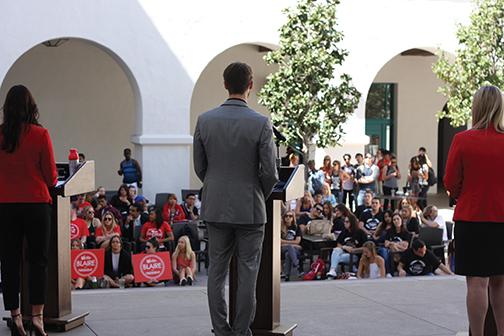
With an array of campus-related issues demanding attention, the presidential candidates of the 2015 Associated Students campaign have their work cut out for them. From sexual assault to divestment concerns, a strong issues platform was imperative in this race. Coming from relatively different backgrounds and experience, the three candidates set themselves apart from one another by their take on addressing student concerns — some coming out stronger than the next.
The three candidates (Blaire Ann Ward, Chelsea Baer and Jeremy Zada) had similar visions for the future of San Diego State: to improve communication and ensure the success of all SDSU students and alumni. Although all these points, however cliche, were promising, it came down to how each candidate wanted to go about achieving said goals that made a difference.
For example, in relation to strengthening student voice and communication with and between A.S., Zada recommends an open suggestion box. I for one have always found the A.S. president to be just as inaccessible as President Hirshman, and therefore don’t see how something as simple as a suggestion box could really do the trick when there is no accountability to showcase if one’s suggestions were ever addressed. On the other hand, Ward’s suggestion for “implemented fireside chats” seems more promising to communicate with a wide amount of students. It’s with these small ideas where one candidate always stands out from the rest.
Aside from communication concerns, many students, along with the editorial board of The Daily Aztec, were interested to see how each candidate would hit the ground running with one of the biggest issues increasingly hindering college life for the past year: sexual assault.
The strongest element mentioned by all three candidates was the idea of education and training for all students, which stems past the current Greek-centered “solutions” the university has implemented thus far. But none of them really took it far enough. It comes down to how each candidate can make it happen and it was a point missed by Ward, Baer and Zada. Students want to know how results will be reached — anyone can toss out suggestions addressed by every major news outlet concerning sexual assault.
Another point that was controversial in its own way was divestment — an issue which divides the student body unlike the generally united views toward sexual assault. Although he risked losing support from a major chunk of the student body, Zada’s strong stance on divestment was respectable. When the other two candidates gave safe responses regarding the need to educate students and not taking sides, Zada took on the argument of how the school’s money should not be invested in oil companies. When it came to this concern, it wasn’t so much Zada’s answer but his ability to make a sound decision.
All in all, most of the candidate responses in this year’s debates were fluffy, predictable and lacking results. Students are sick of hearing the same old suggestions over and over. Although one candidate did set herself apart better than the rest, it was a very fine separation.
One can hope any of the three candidates will implement at least a fraction of their grand ideas, but if that’s going to happen, all three must first work on taking initiative on issues to get results, not votes.








